EXCLUSIVE: Israel’s Role in Syria: Security, Strategy, and Regional Influence
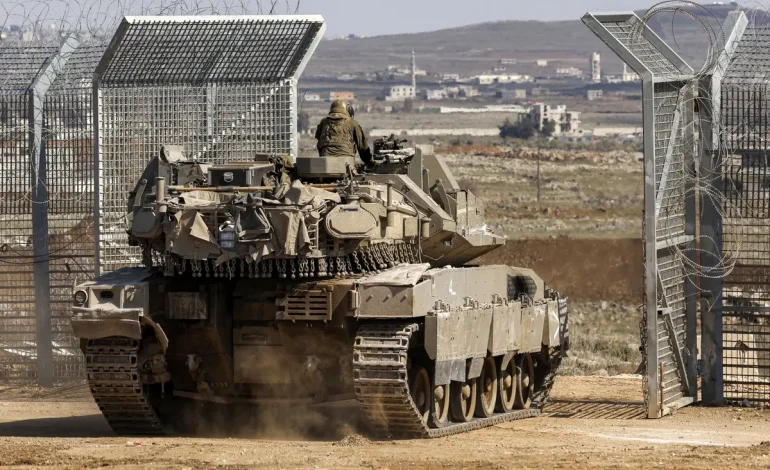

Since the start of the Syrian conflict in 2011, Israel has closely monitored the situation, balancing security concerns with broader regional strategy. However, its role significantly expanded after the collapse of President Bashar al-Assad’s regime in December 2024. The dissolution of the Syrian Arab Army created a power vacuum, prompting Israel to intensify its military activities in Syria.
On December 8, 2024, Israeli forces moved into the United Nations Disengagement Observer Force (UNDOF) buffer zone near the Israeli-occupied Golan Heights. This military operation resulted in the seizure of key locations, including Khan Arnabah, al-Baath, and the Syrian-controlled section of Mount Hermon. Israeli officials justified the move as a necessary step to prevent extremist groups from establishing a foothold near its borders.
In the months that followed, Israel expanded its operations, launching airstrikes targeting Iranian and Hezbollah-linked sites. By April 2025, Israeli airstrikes had struck multiple Syrian cities, including a military airport in Hama, causing casualties and substantial infrastructural damage. These actions reflected Israel’s longstanding policy of preventing Iran from gaining a strategic presence in Syria.
To gain a better understanding of the current situation on the ground in Syria, the historical backdrop of the conflict, and the broader Israeli interests, Wyoming Star spoke with Zach Levey, the Israel Institute Visiting Professor at the University of Colorado, Boulder.
Wyoming Star: Considering prior conflicts between the two nations and Bashar al-Assad’s involvement with the Axis of Resistance, what was Israel’s role in the Syrian civil war? How have Israel’s strategic objectives in Syria evolved in the past 14 years?
Prof. Levey: Israel took a very realpolitik view of the Syrian Civil War. In other words, what was going on in Syria was between and among the Syrians. However, Israel was involved in various ways that served its own strategic and security interests. First, the Israeli view of Bashar al-Assad was, of course, that he was a repressive leader and murderous dictator who dragged his country into the abyss. Why do I say realpolitik?
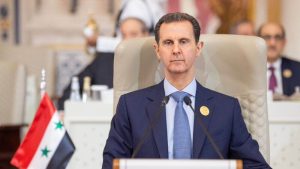
Because the Israeli view was, “We know Bashar al-Assad; we can predict his behavior, his response, and his actions. We would rather let him remain in power than have some unknown entity take over in Syria.”
That was one thing. During the Syrian Civil War, Israel’s principal interests were, first of all, to make sure that Iran did not establish a strategic foothold there and bases that could threaten Israel, and therefore, during the course of the civil war, as Iran backed and supported the Assad regime, Israel struck again and again at Iran as it tried to establish itself. And also every time Israel detected Iranian attempts to use Syria as a conduit with which to arm Hezbollah, to transfer weaponry and equipment to its proxy in Lebanon.
There is another element here, and it is Russia. Russia was the reason the Assad regime survived as long as it did. Without Russian support, Bashar al-Assad would have lost the civil war in that country early on. And as the Russians entrenched themselves, along with a serious air presence. Reaching understandings with the Russians regarding the zone of operations over Syria became essential for Israel. And that meant basically dividing the Syrian skies between them and establishing mechanisms for coordinating the movement of both air forces. It worked fairly well. Russia and Israel did not enter direct clashes; they avoided that.

There was another dimension to Israel’s involvement in the civil war. It is perhaps ironic, but Israel provided humanitarian support for many Syrian civilians in the area that bordered on Israel, which meant supplies and bringing the Syrian wounded to Israeli hospitals, mainly in the city of Safed (Tzfat). And in so doing, the Israelis established a considerable measure of goodwill among the Syrian civilians, which, of course, is heavily ironic, and there were Syrian organizations, such as the Islamic organization Jabhat al-Nusra, Islamic organizations that knew of all of this and stood back while the Israelis provided that aid. They did not forbid their people from accepting it.
So you had situations where Syrian families would find themselves in hospitals in Israel and, to their surprise, encounter many Arabic-speaking nurses and doctors who cared for them.
And so it was a very different dimension to Israel’s involvement in the civil war.
Wyoming Star: How does Israel’s involvement in Syria affect its relationships with neighboring countries, particularly Lebanon and Jordan?
Prof. Levey: In some respects, Lebanon and Syria are continuations of one another, certainly with regard to Israeli policy. Israel holds sway over the skies of Lebanon. There is little that can challenge the Israeli air force over Lebanon, and that air superiority extends to much of Syria. And so Syria becomes the extension of Lebanon in that Israel basically patrols and monitors the border between the two countries to make certain that no foreign power is using Syria as a conduit to Lebanon.
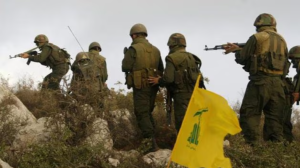
But it goes the other way as well because during the Syrian Civil War, Hezbollah was heavily involved in fighting in Syria. It was very controversial in the Shia community in Lebanon. There were many Shia who asked the question, “Why are we sacrificing our sons on this altar of supporting the Assad regime?” So Israel watched as that transpired. It was not a direct threat to Israel.
The other elements, in fact, were matters of great concern. That is the Iranian presence and whatever it could transfer to Hezbollah via the border. And of course the border between Syria and Lebanon was always porous. It was an open passage between those two countries.
With regard to Jordan, much less so. Israel is very concerned with Jordan’s stability, perhaps ironically because the Jordanian government does not approve of Israel’s actions in various places, naturally. But Jordan knows that Israel provides it with a great element of stability and security.
Wyoming Star: Aside from Israel, there are 3 other major foreign players in Syria: Turkey, Russia, and Iran. How do these countries play into Israel’s strategy, and can Israel avoid potential direct confrontation with them?
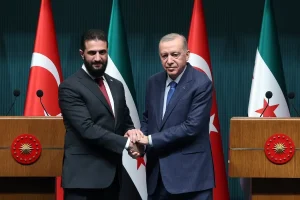
Prof. Levey: That’s going to be an interesting issue now: how to avoid direct confrontation with Turkey. And here there is another irony in that Israel prefers that Russia maintain its presence in Syria as a balancing factor facing Turkey to limit Turkey. Because Turkey has predatory intentions in Syria as far as Israel is concerned. The Turks would like to carve out their own sphere of influence in Turkey. They have their allies and foes in that county, and this is the matter that has taken on much greater importance for Israel in the last weeks. Israel supports, indirectly at least and possibly still directly, the SDF, the Syrian Democratic Forces, that the US also supports. To Turkey, those Kurdish forces are an enemy, but it is also and more seriously a matter of air control over Syria. And it is not inconceivable that Israel and Turkey would have to reach an understanding about who has control of what segments of Syrian airspace. If Syria is willing to cede this kind of sway to Turkey.
With Iran, I think, in the meantime, it has made it very clear to Iran that it is not going to use Syria as a station and a base with which to transfer arms to Hezbollah. And a series of blows to Iran in Syria and into Iran itself have established that in the meantime.
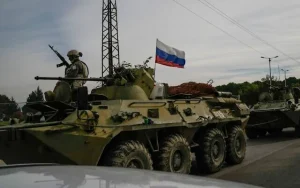
There are two ways in which Israel can avoid conflict with these various elements. With Russia, there is already a mechanism that can be a continuing basis for avoiding clashes.
With Iran, it is the indirect message to Iran, “We’ve hit you, and we’ll hit you again. And we can do so when we deem necessary. Harder if we wish to do so. So be very careful.”
And as far as Turkey, that is a rising challenge to Israel, and so I have less to say about that. Except that Ankara and Jerusalem are going to have to decide how they proceed, and for both of them, it will mean taking great care. Because the rhetoric from Turkey is inflammatory, it is highly anti-Israel. And at the same time, Turkey is no stranger to strategic calculations. They know much about Israel’s interests and the intensity of Israel’s interests in Syria.
Wyoming Star: How do the Golan Heights factor into Israel’s strategic interests in Syria, and what are the implications for future territorial negotiations?
Prof. Levey: Here the answers are much more clear. And I can tell you with a degree of academic authority based on the consensus among anyone who deals with the region seriously that there is no future for territorial negotiations. That simply isn’t going to happen. Not at any time in the next few years.
Israel is certainly not contemplating negotiating with Syria the return of any part of the Golan, and in fact, quite the opposite.
Israel has taken over the highest point on Mount Hermon, or, if you wish, in Arabic it is Jabal al-Shaykh, and those are the high mountains overlooking the entire region. And the Syrians for decades, even after Israel had taken over much of the mountain range, controlled what the Israelis called the Syrian Hermon. And that was the highest point. After Ahmed al Sharaa’s victory in the civil war, the Israelis moved in, and they took over another slice of the Golan ostensibly for Israeli security purposes, and that included the Syrian Hermon, the highest point on Mount Hermon. The point is that Israel is not going to move from those new positions at any time in the foreseeable future and views the Golan as a strategic asset to ensure Israeli security at the most basic level, on the ground. And it is a vital border region and a buffer between Israel below and its volatile neighbor Syria.
Wyoming Star: In what ways does Israel’s engagement in Syria influence the dynamics of the Israeli-Palestinian conflict?
Prof. Levey: That’s more indirect because there are no Palestinians on the Golan Heights, of course. There are Palestinian refugee camps in Syria, but Syria is not a main arena for Israel in fighting Palestinian influence. However, as in the past, Israel’s actions in other areas signaled to the Palestinians Israeli determination to conduct whatever operations are necessary and to extend its military intervention into whatever arena Israel deems essential for its security.
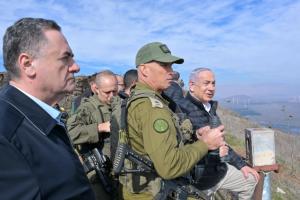
It sends a strong signal to any of Israel’s adversaries, and this includes the militant groups that fight Israel.
Of course you have the Palestinian Authority, which largely cooperates with Israel even on security matters, but these are, to a great extent, two separate arenas. There is certainly a link. But in the past, for example, in Lebanon before Israel launched its large-scale invasion of Lebanon in 1982, the thinking of the right-wing Likud government of Menachem Begin at that time and certainly of the minister of defense, Ariel Sharon, was that what Israel does in Lebanon has a direct effect upon Palestinian national hopes in the West Bank and Gaza. So, you know, it’s not inconceivable that Israel links one arena with another that is one of its operations in one of the Arab neighboring states with the Palestinian theater in this case, less it’s less direct.
Wyoming Star: How does the Israeli public perceive the nation’s involvement in Syria, and what impact does this have on policy decisions?
Prof. Levey: That’s an interesting question because, really, the Israeli public is focused now on Gaza. There is an interest, but there are no powerful feelings involved as with, say, Gaza or even the West Bank, from which terror emanates and where Israeli settlers run rampant against Palestinian civilians and where the IDF operates in an intense manner. And of course there’s the whole question of the future of those territories because, unlike with regard to the Golan Heights, there is a horizon for negotiations, at least theoretically. But with regard to Syria, I think that most of the Israeli public, from everything that I’ve seen in the Israeli press, treat Israel’s strategic operations in Syria as a matter of course; that is, there’s nothing particularly controversial about it. Yes, the left-leaning newspaper Haaretz calls into question the necessity of Israeli occupation of even more of the Golan.
So it does come into the news, but most of the Israeli public has focused its attention elsewhere. What Israel does in Syria is not greatly controversial, and therefore it does not have any significant influence on Israel’s policy decisions.
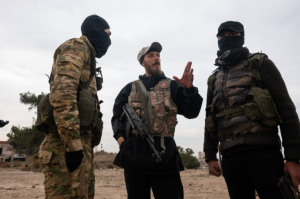
Wyoming Star: There are speculations about Syria vanishing from the world map and being divided between the regional powers. How do you see Israel’s role in Syria’s future and how it might affect the whole of the Middle East?
Prof. Levey: Israel is dealing with an unwelcome situation in Syria because again there is that realpolitik approach:
Better the devil we know, and that devil was Bashar al-Assad. And now matters are unpredictable in Syria.
It’s not certain how long Mohammad al-Joulani, whose real name is Ahmed al-Sharaa, will last in power. He has a force of about 30,000 men. It’s not even a regular army. It’s not enough to hold Syria together in security terms militarily to ensure his regime with all of these different groups and powers ready to pounce at any opportunity, and foremost among them the Sunni majority. Many of the Sunnis are extremely unhappy with the way things have turned out after the civil war. And so Israel watches this very closely. There is no prospect at all of what you would call Israeli-Syrian peace, and even if Israel really, really wanted to sign a peace treaty, with whom would it be? There’s no coherent government in Syria that could responsibly sign a lasting agreement with Israel, and so Israel’s entire approach is based upon deterring whatever elements are necessary in Syria and the powers involved in that country: Turkey, Iran, Russia (with whom matters are much easier; there are understandings with the Russians), and of course Hezbollah and whatever power may succeed in the future in overthrowing in turn Ahmed al-Sharaa, the current Syrian regime.
Wyoming Star: So we can’t talk about the civil war ending in the near future?
Prof. Levey: No, I don’t see it. Well, I mean that phase of the Civil War is completed. Unless, of course, historians choose in another 10, 15, or 20 years to view all of this as one long, unending civil war phase after phase, with the Ahmed al-Sharaa and Hay’at Tahrir al-Sham organizations being only one more ruler in a country in which control passes from one group to the next every few years.
With input from Reuters, the Wall Street Journal, and the Associated Press.









The latest news in your social feeds
Subscribe to our social media platforms to stay tuned